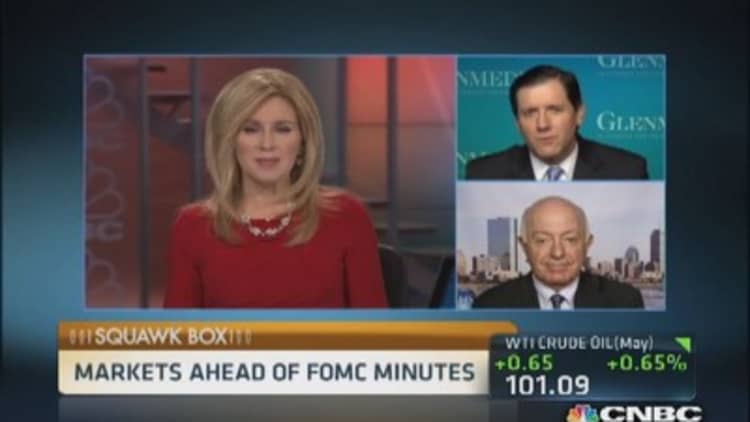After the tech sector's brutal selloff and this year's strong run for utility and healthcare stocks, investors are now considering a meaningful shift into more "cyclical" names.
There has recently been a sharp drop in the Nasdaq and caution in Asia and Europe markets. However economic indicators around the world are slowly improving. All this has left investors uncertain about where to place their cash.
Read MoreEurope cautiously lower after selloff; Ukraine watched
However, a combination of earnings momentum, economic data and flows from exchange-traded funds all seem to point to the "cyclicals" -- stocks whose value tends to follow changes in the business or economic cycle , such as industrials, financials, basic resources and even autos.
ETF money flows in March reflect the belief that the U.S. economy will accelerate over the next few quarters, with funds dedicated to financial stocks gaining $1.5 billion of inflows last month, while products which focus on consumer non-cyclicals had $752 million of outflows.
Read MoreHere's why a momentum bounce could be looming
Ahead of the sell-off, technology saw $939 million of inflows and basic materials $895 million were also a winner last month.
"If you were to look up 'cyclical rotation' in the dictionary, you'd see March's ETF money flows in the definition," said Nicholas Colas, chief market strategist at ConvergEx Group, who cited data from XTF.
Analysts have also been watching the Citigroup Economic Surprise Index, which tracks how data is faring compared with expectations for the 10 major world economies.
Read MoreHigh-frequency trading sees a planet divided
The index rises when economic data come in better than economists' estimates and falls when it is worse and has been falling in recent months, due in part to extreme weather conditions in the U.S.

"The very tight relationship between economic surprises and the performance of cyclicals suggests cyclicals may soon make a comeback relative to more defensive sectors," said chief market strategist for LPL Financial, Jeff Kleintop.
Investment banks are also backing the move. Citi are now overweight cyclical stocks in Europe and underweight defensives such as chemicals, food & beverage, oil & gas and telecoms.
Citi said earnings momentum strategies have been working well so far this year, with autos, banks, basic resources and insurance the four sectors with positive relative earnings momentum over six months and trading on a price to earnings (P/E) discount to market.
Read MoreWall Street seen boosted after 3-day selloff
"Earnings momentum favors cyclicals over defensives. So do we," said Citi analysts led by Jonathan Stubbs in a research note.
"Generally, it is financial and cyclical -- rather than defensive -- sectors which have stronger earnings momentum trends. This is also how we are positioned in our European sector strategy," he said.
Stubbs noted that stocks such as Italian carmaker Fiat, Lloyds Banking Group, Societe Generale and Credit Agricole all look among the cheapest stocks, if take their long-term earnings momentum into consideration.
Goldman Sachs is also eyeing a pro-cyclical stance, following the downgrade to China growth. The volatility in emerging markets from December to mid- March had eased significantly from the shock the market saw from May to July 2013.
Read More'Scared' Dennis Gartman: Get out of stocks
"As a result, we think that cyclical improvement is likely to be the major theme in the next month or two as the reality of some improvement on these fronts is reflected more broadly," said chief markets economist at Goldman Sachs, Dominic Wilson.
"We think the reality of a better cyclical picture has not yet been fully priced. If we are right, the improving cyclical environment should continue to support equities, while pushing yields higher," he added.


